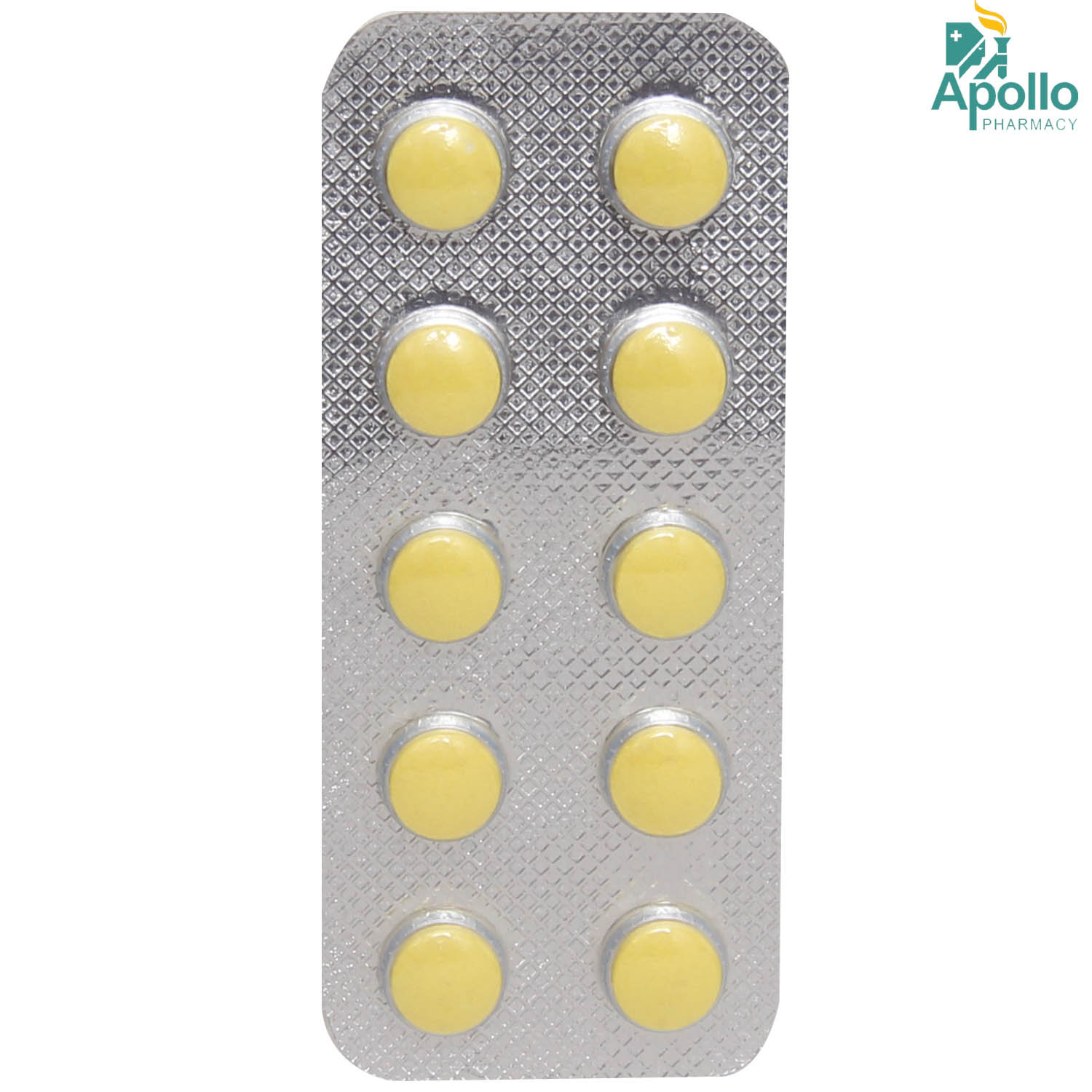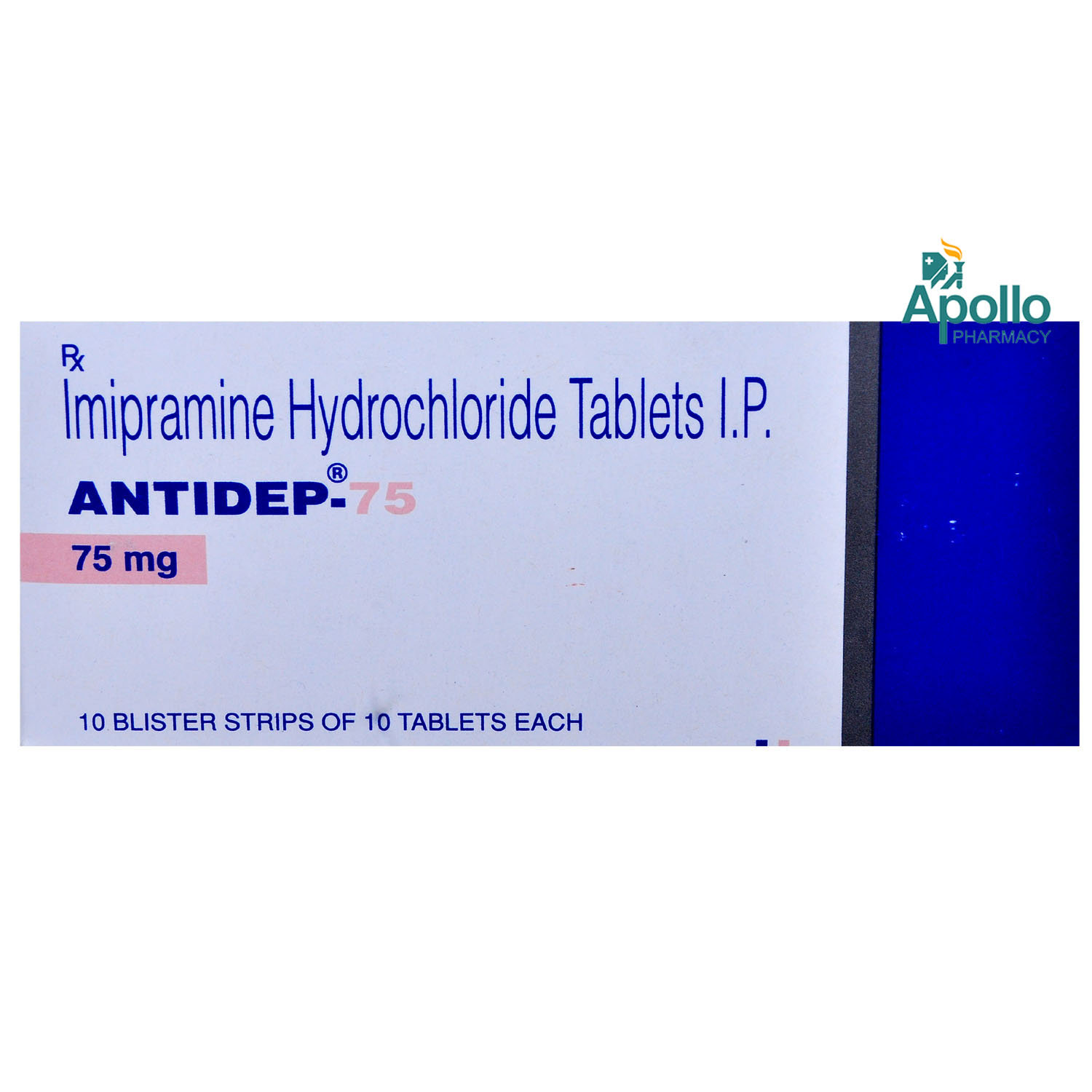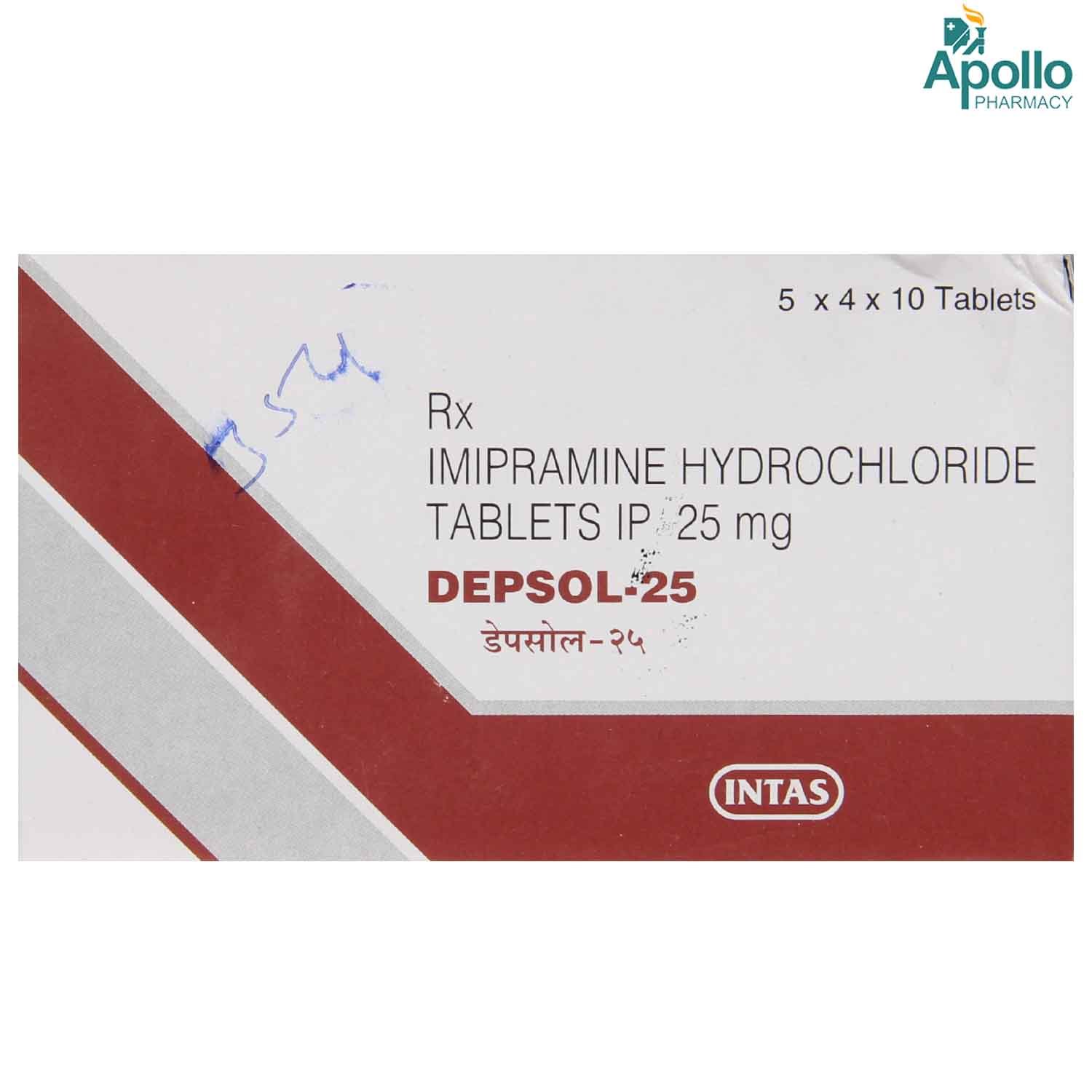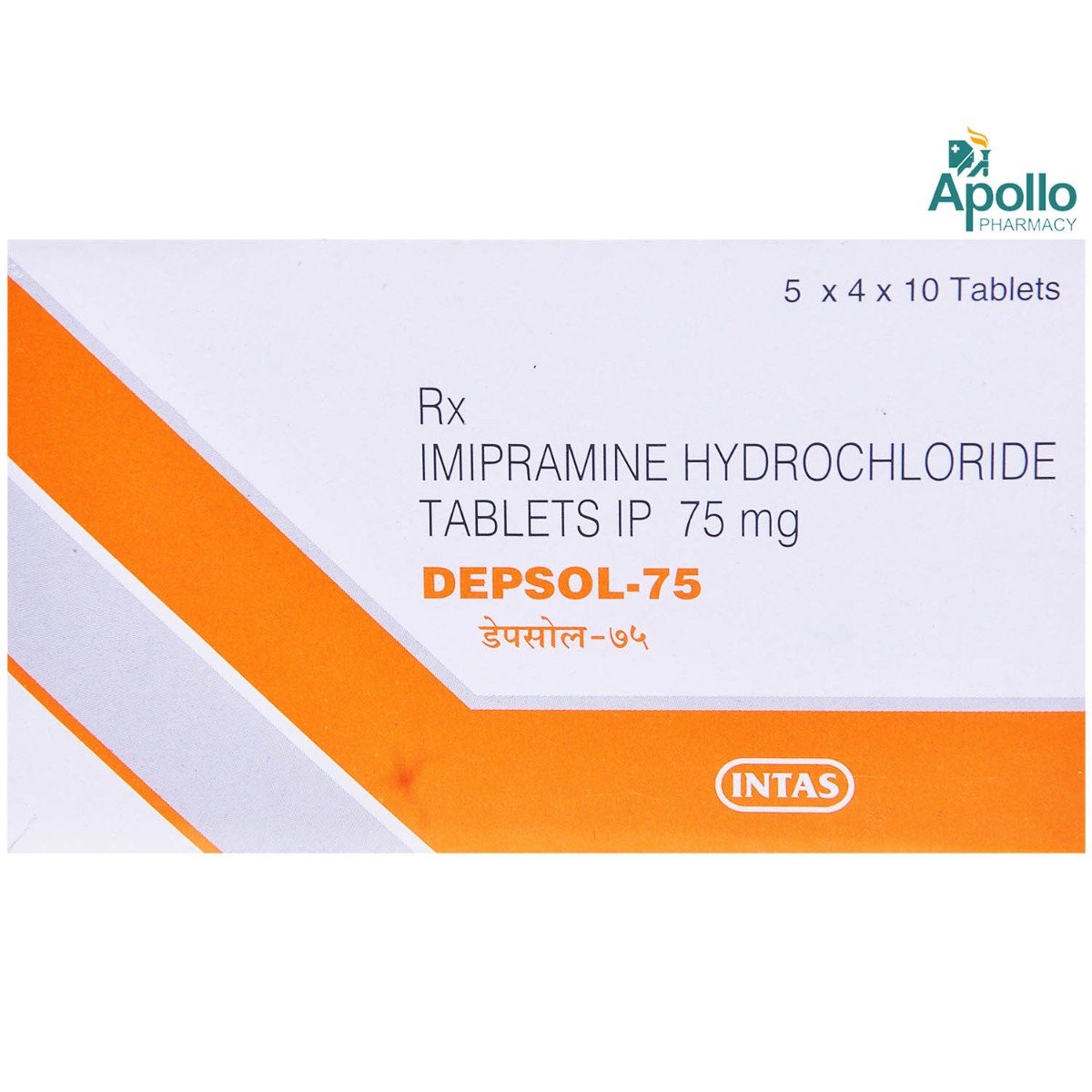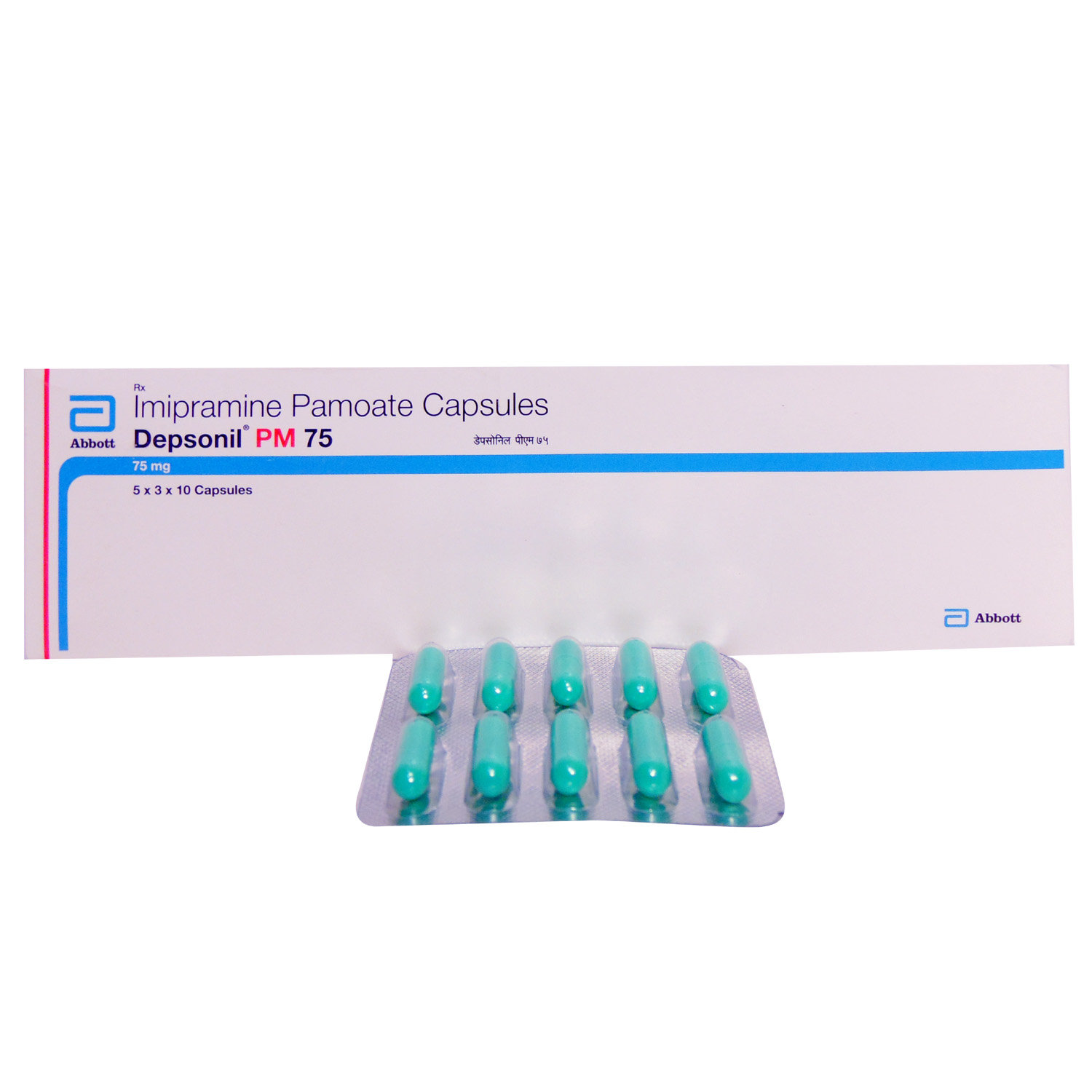Imipramine
About Imipramine
Imipramine belongs to a group of medicines called 'tricyclic anti-depressants' used to treat depression. Additionally, Imipramine is also used to treat bed-wetting at night in children aged 6 years and older. Depression is a mood disorder characterised by sadness, unhappiness, anger, hopelessness or loss that interferes with a person’s daily activities.
Imipramine contains ‘Imipramine’, which increases the activity of certain natural substances (neurotransmitters) in the brain required for mental balance, thereby regulating mood and treating depression. It also reduces childhood enuresis or bed-wetting in the children older than 6-7 years of age by relaxing the urinary bladder muscle, which lightens the sleep.
You are advised to take Imipramine for as long as your doctor has prescribed it for you depending on your medical condition and response to the treatment. In some cases, you may experience certain common side-effects such as dry mouth, nausea, vomiting, increased blood pressure, lack of coordination, swelling of the breast and weakness. You are advised to talk to your doctor if you experience these side-effects persistently.
Please do not stop taking Imipramine without consulting your doctor as it could lead to withdrawal symptoms. Consult your doctor if you are pregnant or breastfeeding. Avoid driving or operating machinery as Imipramine may cause impaired alertness, drowsiness or blurred vision. Imipramine is not recommended for children below 6 years as safety and effectiveness have not been established. Avoid consuming alcohol with Imipramine as it could lead to increased drowsiness. Keep your doctor informed about your health condition and medicines to rule out any side-effects.
Uses of Imipramine
Medicinal Benefits
Imipramine belongs to a group of medicines called tricyclic anti-depressants. Imipramine is used to treat depression. Imipramine works by increasing the activity of certain natural substances in the brain needed for mental balance, thereby regulating mood and treating depression. Additionally, Imipramine is used as an adjunct therapy in reducing bed-wetting at night in children aged 6-7 years and older. Imipramine helps to control childhood enuresis or bed-wetting as a part of its anti-depressant effect.
Directions for Use
Storage
Side Effects of Imipramine
- Dry mouth
- Nausea
- Vomiting
- Increased blood pressure
- Lack of coordination
- Swelling of breast
- Weakness
- Trouble urinating
- Blurred vision
- Breast swelling in men and women
Drug Warnings
Do not take Imipramine if you are allergic to any of its contents; if you are taking monoamine oxidase inhibitors (MAOI) or have taken them in the last 14 days, if you have heart diseases, mania, porphyria, glaucoma or are unable to pass urine. Avoid taking buprenorphine/opioids with Imipramine as it could lead to serotonin syndrome. Inform your doctor if you have/had schizophrenia or manic depression, alcohol withdrawal, enlarged prostate, overactive thyroid, epilepsy, low blood pressure, poor circulation, panic attacks, a tumour of the adrenal gland, or if you are being given electroconvulsive therapy. Talk to your doctor immediately if you have suicidal thoughts such as killing or harming yourself. Consult your doctor if you are pregnant or breastfeeding. Avoid driving or operating machinery as Imipramine may cause impaired alertness, drowsiness, or blurred vision. Imipramine is not recommended for children below 6 years as safety and effectiveness have not been established. Avoid consuming alcohol with Imipramine as it could lead to increased drowsiness. Rise slowly from sitting or lying position as Imipramine causes dizziness on standing suddenly.
Drug Interactions
Drug-Drug Interactions: Imipramine may interact with anti-depressants (fluoxetine, fluvoxamine, duloxetine, escitalopram, sertraline), antipsychotics (aripiprazole, quetiapine), anti-convulsant (carbamazepine, phenytoin, phenobarbital, pregabalin, topiramate), benzodiazepine (diazepam, nitrazepam, oxazepam, alprazolam, clonazepam), pain killer (aspirin, tramadol, codeine, dihydrocodeine), anti-HIV (ritonavir), antacid (cimetidine, esomeprazole), blood thinner (warfarin), skeletal muscle relaxant (cyclobenzaprine), anti-anxiety (alprazolam) and hormone (levothyroxine).
Drug-Food Interactions: Do not take St. John’s wort (herbal supplement to treat depression) along with Imipramine.
Drug-Disease Interactions: Inform your doctor if you have epilepsy, low blood pressure, overactive thyroid, urination problems or enlarged prostate, glaucoma, diabetes, schizophrenia, mania, pheochromocytoma (tumour of the adrenal gland), heart, kidney or liver problems.
Drug-Drug Interactions Checker List:
Safety Advice

Alcohol
unsafeAvoid consumption of alcohol while taking Imipramine as it may cause increased drowsiness.

Pregnancy
cautionImipramine belongs to pregnancy category C. Please consult your doctor if you have any concerns regarding this; your doctor will prescribe only if the benefits outweigh the risks.

Breast Feeding
cautionImipramine may pass into breastmilk. Consult your doctor before taking Imipramine; your doctor will decide whether Imipramine can be taken by breastfeeding mothers or not.

Driving
unsafeImipramine may cause impaired alertness, drowsiness or blurred vision. Do not drive or operate machinery if you experience these symptoms.

Liver
cautionDose adjustment may be needed in patients with liver impairment. Please consult your doctor if you have a liver impairment or any concerns regarding this.

Kidney
cautionDose adjustment may be needed in patients with kidney impairment. Please consult your doctor if you have kidney impairment or any concerns regarding this.

Children
cautionImipramine is not recommended for children below 6 years as its safety and effectiveness have not been established.
Habit Forming
Diet & Lifestyle Advise
- Maintain a healthy diet and exercise regularly as it helps in improving overall health and boosts self-esteem.
- Regularly attend therapy sessions.
- Perform meditation and yoga. This helps in relieving stress and provides relaxation.
- Follow a regular sleep pattern to improve the amount and quality of sleep you get.
- Include foods rich in omega fatty acids such as fish, nuts, fresh fruits, vegetables and olive oils.
- Neurotransmitters are made up of amino acids. Amino acid-rich foods such as meat, dairy products, and certain fruits and vegetables help in the proper maintenance of neurotransmitters.
- Complex carbohydrates help in stimulating serotonin (a feel-good neurotransmitter). These include whole grains, legumes, spinach, broccoli, oranges and pears.
- Exercising helps in the production of the body’s natural anti-depressants. It also helps in relieving stress, improves mood, boosts self-esteem and provides restful sleep.
- Avoid smoking and alcohol consumption.
- Learn about your condition, understand the risk factors and follow the doctor’s treatment plan.
Special Advise
- Close monitoring of patients taking Imipramine for suicidal behaviour, clinical worsening, or unusual changes in behaviour is recommended. Consult the doctor immediately if the patient experiences suicidal thoughts such as killing or harming oneself.
- Talk to your doctor before taking Imipramine if you are due to have any surgery that involves an anaesthetic, including dental surgery.
- Your doctor may advise regular blood tests and liver functioning tests while taking Imipramine.
- Imipramine may cause problems with your teeth, so a regular dental check-up is advised.
Patients Concern
Disease/Condition Glossary
Depression: Depression is a mental health disorder characterised by a persistent and intense feeling of sadness for an extended duration of time. It mainly impacts mood, behaviour and other physical functions, such as sleep and appetite. Symptoms include sadness, loss of interest, appetite changes, sleep problems, restlessness, lack of energy, feeling worthless or guilty, thoughts of harming oneself, difficulty in concentrating, making decisions and thinking. The exact cause of depression is unknown. However, factors such as stress, changes in hormone levels, alcohol or drug abuse, abuse during childhood, certain medical conditions and medications might increase the risk of developing depression.
Bed-wetting: Childhood enuresis is also known as bed-wetting in children. In most cases, children are toilet trained by the age of 5, but generally, there is no target date for complete bladder control development. A small number of children still wet the bed even after the age of 7 years. This may or may not be purposeful, and the condition is not diagnosed until the child is 5 years or older. The causes could be a small bladder, urinary tract infections, stress and developmental delays that could interfere with toilet training. Symptoms include repeated bed-wetting, wetting in the clothes and wetting at least twice a week for 3 months.
FAQs
Imipramine works by increasing mood-enhancing chemical messengers (neurotransmitters) such as serotonin and norepinephrine in the brain that communicate between brain cells, thereby regulating mood and treating depression.
Do not discontinue Imipramine without consulting your doctor as it could lead to withdrawal symptoms. To treat your condition effectually, continue taking Imipramine for as long as prescribed. Do not be reluctant to speak with your doctor if you feel any difficulty while taking Imipramine. The doctor may reduce the dose gradually to prevent withdrawal symptoms.
Dry mouth could be a side-effect of Imipramine. Limiting caffeine intake, avoiding smoking and mouthwashes containing alcohol, drinking water regularly and chewing sugar-free gum/candy might stimulate saliva and prevent drying of the mouth.
Orthostatic hypotension could be a side-effect of Imipramine. Orthostatic hypotension is a sudden lowering in blood pressure leading to dizziness on standing. If you experience this, do not try to stand up suddenly or start walking, instead, lie down and get up slowly only when you feel better.
Imipramine may cause photosensitivity or increased sensitivity to sunlight. Therefore, people taking Imipramine should avoid excessive exposure to sunlight or tanning beds. Use effective sunscreen and wear protective clothing while going outside.
Consult your doctor before taking Imipramine if you are diabetic, as Imipramine may cause elevation or lower blood glucose levels. Regularly monitor blood sugar levels while taking Imipramine.
Imipramine may make your open-angle glaucoma worse. Your doctor may monitor your vision while you’re taking this medication.

